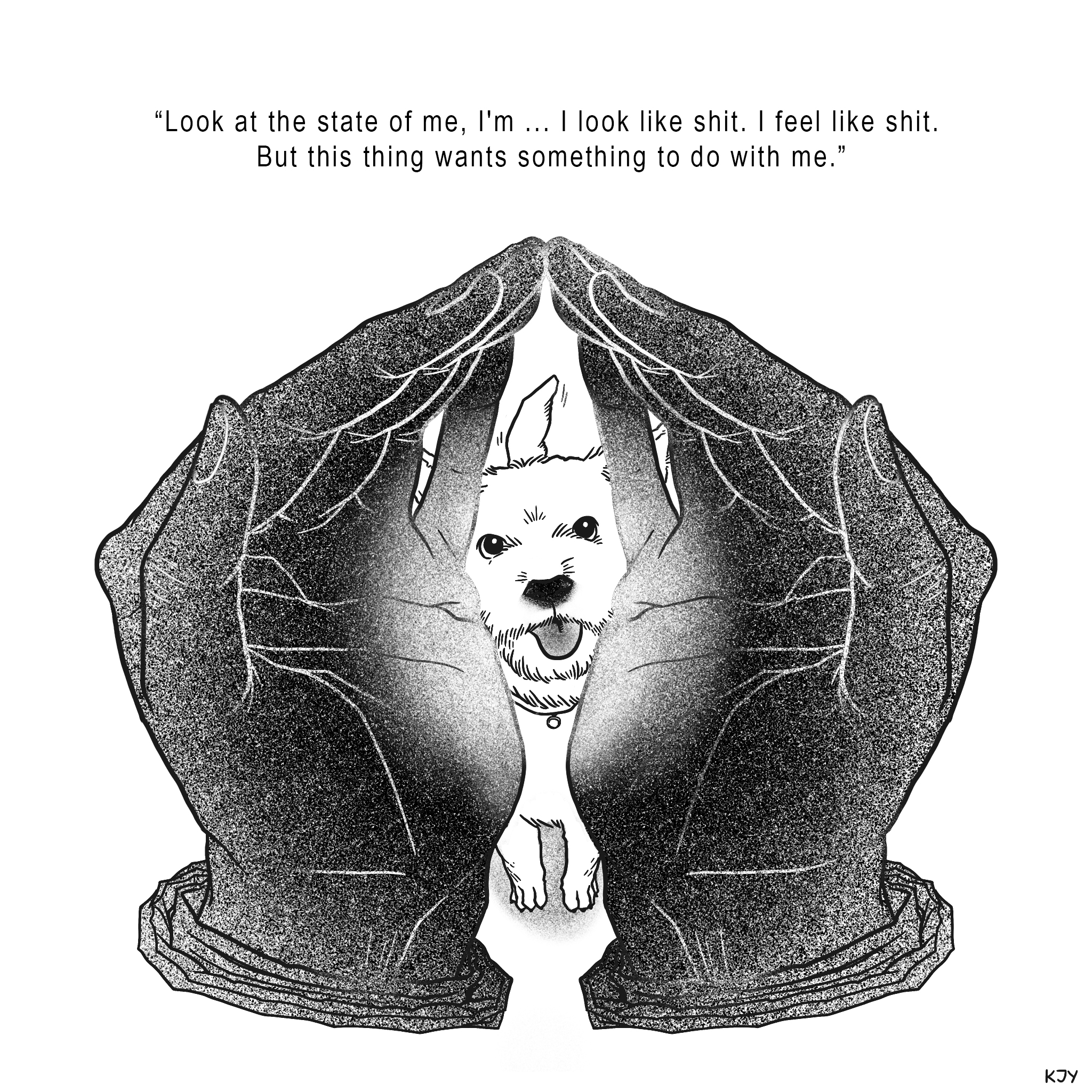Monday, 15 February 2021
Homeless pet owners are having to choose between a roof over their heads and their animal, according to a new study led by experts from the University of Nottingham.
The results of the study, published in the journal Anthrozoos, showed that homeless pet owners found they had reduced access to services including accommodation, advice and healthcare. The research also showed that the relationship between homeless dog owners and their pets is crucially important to them and can have a positive impact on their physical and mental wellbeing.
The research was led by an interdisciplinary team from the Schools of Veterinary Medicine and Science, and Sociology and Social Policy at the University of Nottingham, in collaboration with the School of Psychology at the University of Southampton.
 Artwork Copyright Karen Jiyun Sung
Artwork Copyright Karen Jiyun Sung
Homelessness is a prevalent social issue worldwide. In the UK, it is estimated that one in two hundred people are homeless, accounting for 0.5% of the population, and this is rising in the wake of the Covid-19 pandemic.
Pet ownership among homeless people is common and has been linked with a range of health and social benefits, including alleviating loneliness, isolation and depression and a reduction in suicidal thoughts, substance abuse and criminal activity. However, pet ownership is also thought to perpetuate homelessness, by restricting access to support services.
In this new study, experts explored the nature of the Human Companion Animal Bond (H-CAB) between UK homeless owners and their dogs, and looked at the implications of this bond on the health and welfare of both parties. This is the first study to look at this relationship in detail.
 Artwork Copyright Karen Jiyun Sung
Artwork Copyright Karen Jiyun Sung
Louise Scanlon, one of the lead researchers on the project, interviewed twenty homeless or vulnerably housed dog owners, aged between 23-65, from seven locations in England – London, Nottingham, Lincoln, Spalding, Preston, Gillingham and Plymouth.
Common themes to emerge from the interviews included:
- Many participants described their pets as kin - like friends or family, sharing closeness and unconditional love;
“He is my best mate. I love him as much as I love myself. We are both the same.”
- The notion of animals as ‘kin’ appeared to create a sense of responsibility, giving them obligation for someone other than themselves;
“Our dogs would eat before anyone else.”
- Some owners admitted if they lost their pet, they would lose any incentive to take care of themselves;
“I don’t know what I’d do; it would be a massive gap in my life. I’d probably stop eating.”
- Many owners spoke of having rescued their dog, either from welfare organisations or neglectful owners
 Artwork Copyright Karen Jiyun Sung
Artwork Copyright Karen Jiyun Sung
The results of the study showed that:
- Dog-ownership and the relationship between the owner and the dog has implications for the owner’s physical and psychological, and was an important social facilitator
- Several owners reported an increase in physical activity and motivation to go outside because of their dogs;
- Participants spoke about being protected from physical threat by their dogs;
- The practical necessity of providing for their pet resulted in a reduction in substance misuse;
- Owners relayed the positive effect their pet had on mental illness such as depression and anxiety;
- Pets reduced feelings of isolation and loneliness.
The data collected also revealed a close association between dog ownership and the desire for improved self-care and behaviour change.
 Artwork Copyright Karen Jiyun Sung
Artwork Copyright Karen Jiyun Sung
Dr Jenny Stavisky, one of the study’s authors, said: “It is clear from this sample of homeless dog owners, that the relationship with their pets is really important to them. There are also clear benefits to their health wellbeing from owning a dog.
“Homeless pet owners have not been studied in much detail to date, and we can see through our analysis that there is a real gap in services for this group in the UK. This will have only been heightened by the Covid-19 pandemic. The stigma surrounding homelessness and dog ownership could be addressed by recognising the importance of these relationships to both animal and human health.
"We need to see policy changes, which will remove barriers to essential services to help ensure that homeless pet owners are not forced to choose between a roof over their head and their pet. New initiatives such as the updated Model Tenancy Agreement are to be welcomed. If the proposed Jasmine’s Law, which was partly inspired by a homeless man who died as a result of being separated from his pets, is passed, this will enable more homeless families, with two feet or four, to stay together.”
The study was funded by the Dogs Trust.
Story credits
Study DOI: 10.1080/08927936.2021.1878683
More information is available from jenny.stavisky@nottingham.ac.uk from the School of Veterinary Medicine and Science at the University of Nottingham at jenny.stavisky@nottingham.ac.uk
Notes to editors:
About the University of Nottingham
Ranked 97 in the world and 17th in the UK by the QS World University Rankings, the University of Nottingham is a founding member of Russell Group of research-intensive universities. Studying at the University of Nottingham is a life-changing experience, and we pride ourselves on unlocking the potential of our students. We have a pioneering spirit, expressed in the vision of our founder Sir Jesse Boot, which has seen us lead the way in establishing campuses in China and Malaysia - part of a globally connected network of education, research and industrial engagement.
Nottingham was crowned Sports University of the Year by The Times and Sunday Times Good University Guide 2024 – the third time it has been given the honour since 2018 – and by the Daily Mail University Guide 2024.
The university is among the best universities in the UK for the strength of our research, positioned seventh for research power in the UK according to REF 2021. The birthplace of discoveries such as MRI and ibuprofen, our innovations transform lives and tackle global problems such as sustainable food supplies, ending modern slavery, developing greener transport, and reducing reliance on fossil fuels.
The university is a major employer and industry partner - locally and globally - and our graduates are the third most targeted by the UK's top employers, according to The Graduate Market in 2024 report by High Fliers Research.
We lead the Universities for Nottingham initiative, in partnership with Nottingham Trent University, a pioneering collaboration between the city’s two world-class institutions to improve levels of prosperity, opportunity, sustainability, health and wellbeing for residents in the city and region we are proud to call home.
More news…